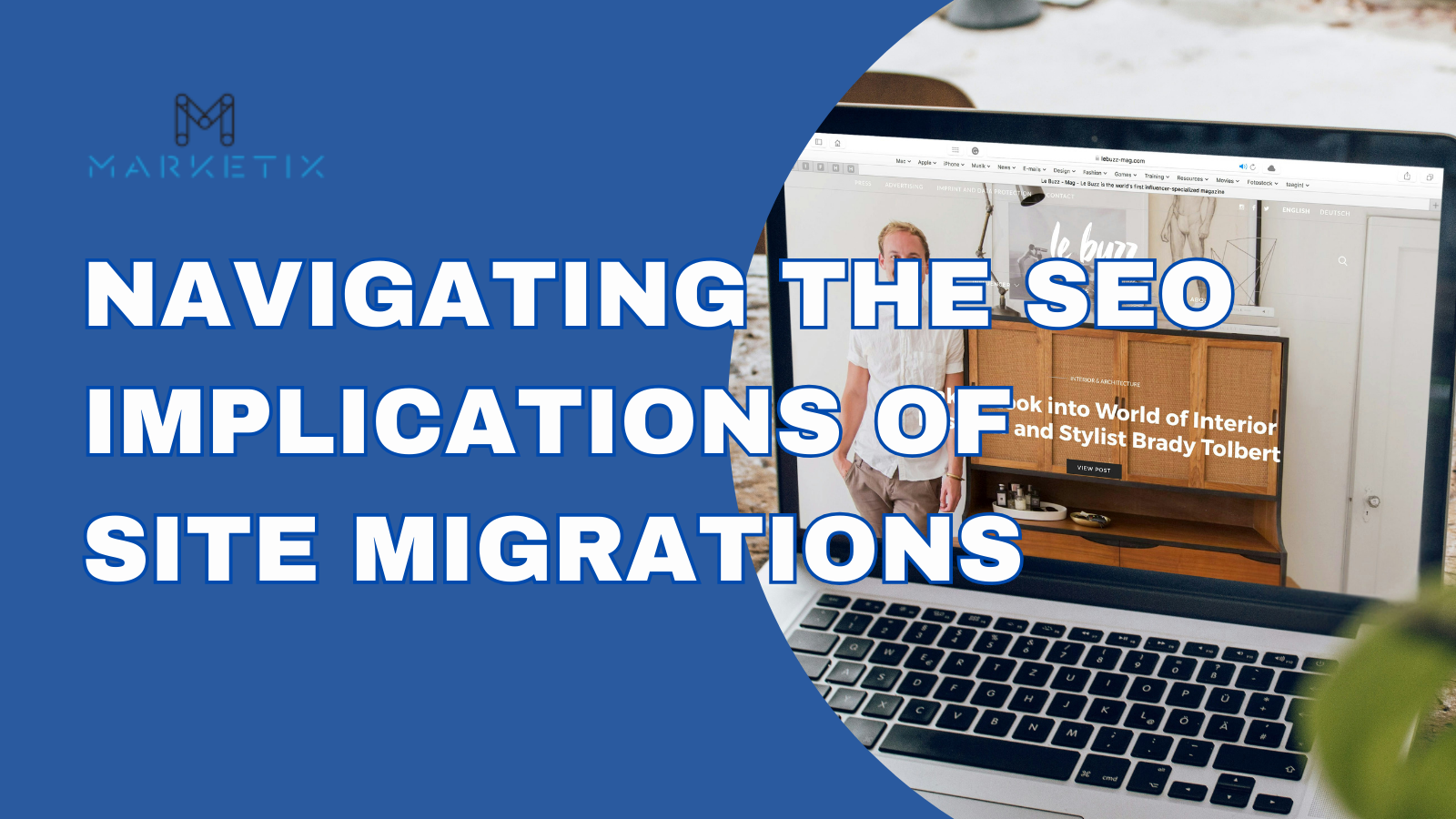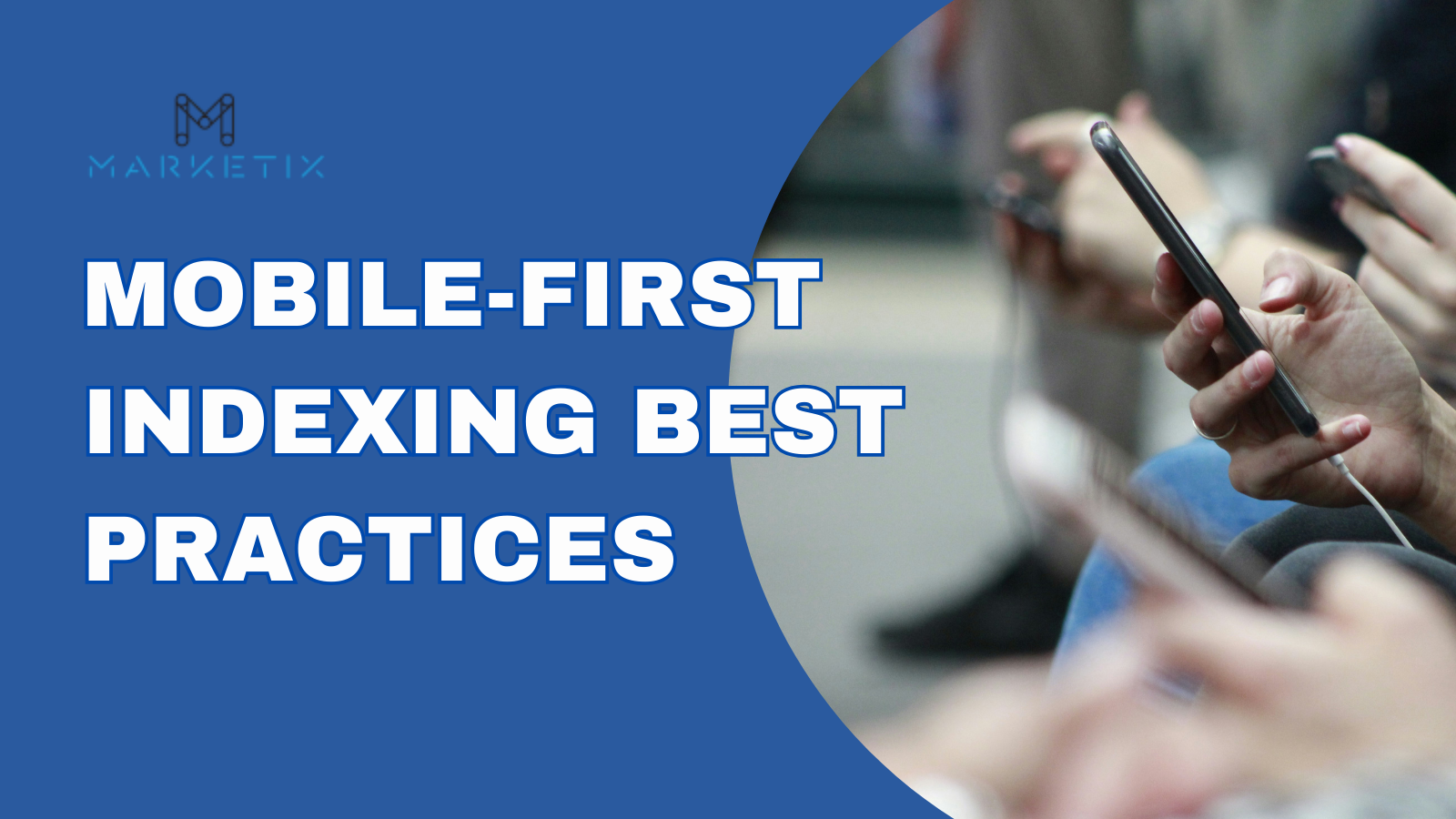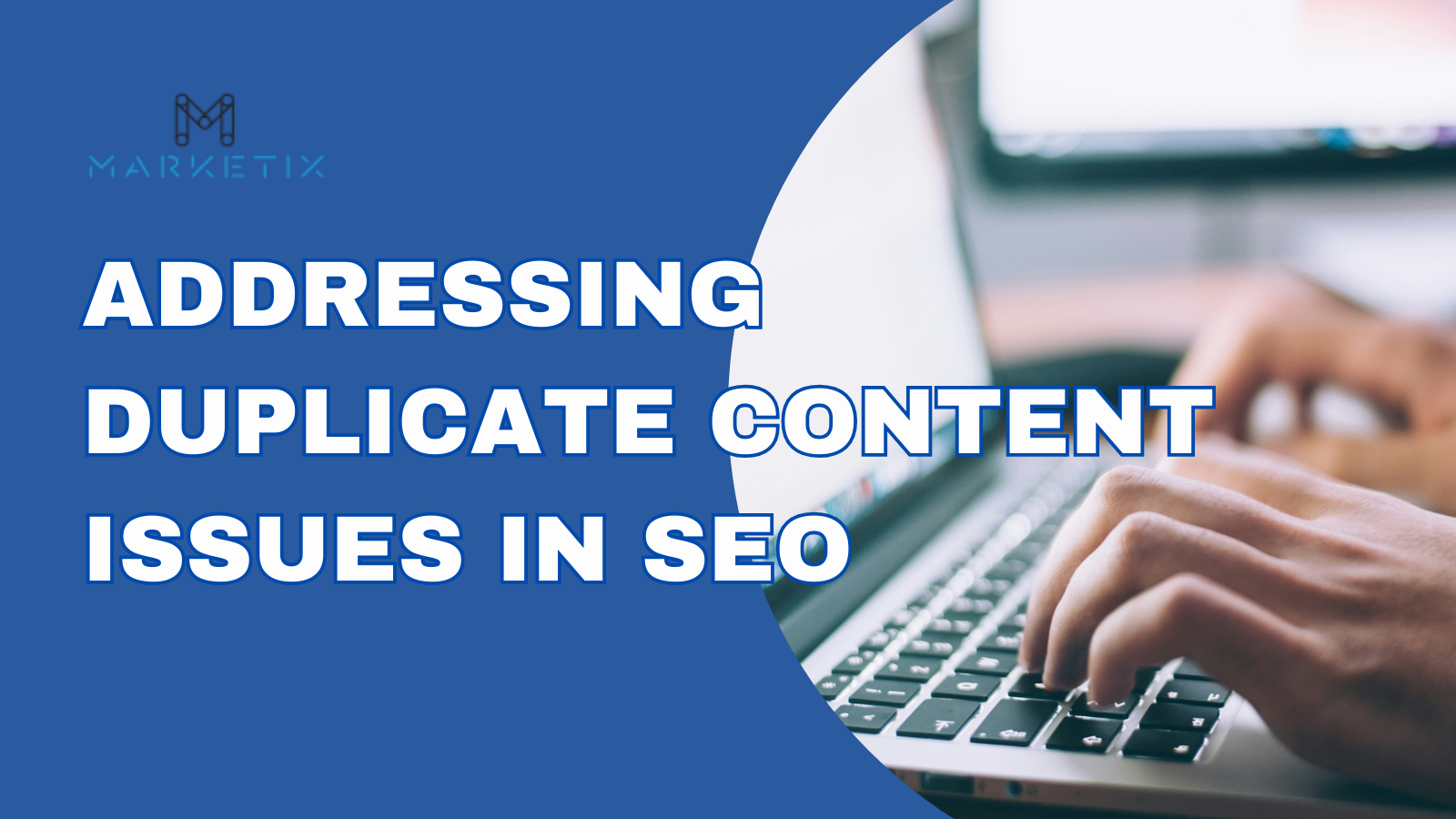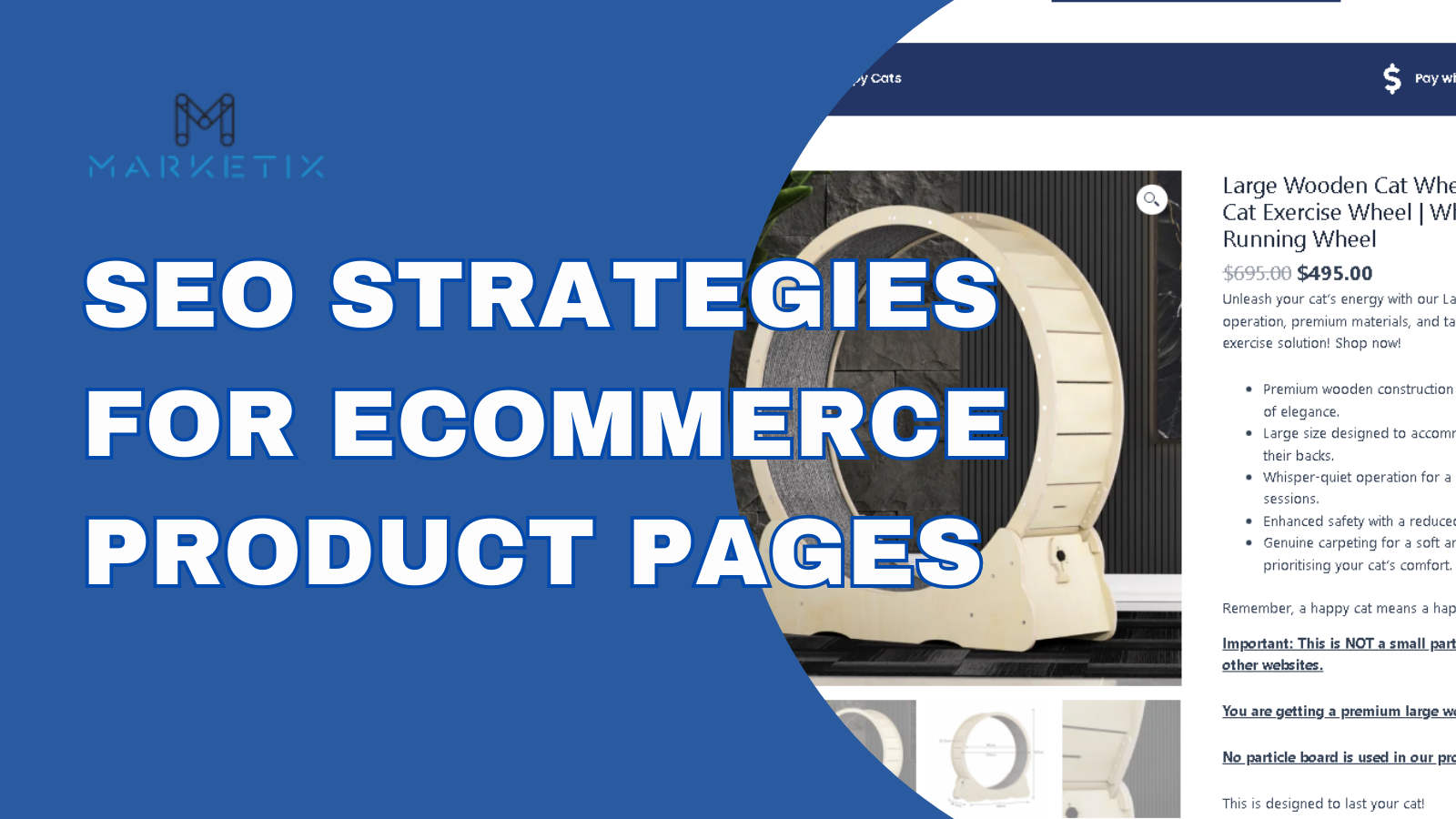- Home
- > The Marketix Blog
- > SEO
What is Entity SEO?
If ever there is a perfect way to enhance your SEO strategy, it is by implementing Entity SEO.
A shift from the traditional keyword focus to a more sophisticated understanding of context and meaning.
Entity SEO, emerging from Google's groundbreaking Knowledge Graph, encapsulates this shift. It embodies the concept of "things, not strings," a transformative approach that has been evolving since May 2012.
Yet, despite over a decade of importance, the concept of Entity SEO remains shrouded in confusion.
This confusion stems from a lack of widespread usage, a significant overlap with keyword-based methods, and the complexity of understanding entities.
Many SEOs need help to grasp their full potential, often conflating entities with keywords or topics. This scientific approach to SEO, intertwined with machine learning and Google's patents, demands a deep dive into technical knowledge, a task not every SEO enthusiast finds appealing.
So, why does Entity SEO matter?
It holds the key to unlocking a more profound understanding of search intent and user experience.
Let’s talk more about its importance…
Why is Entity SEO Important?
Short Answer: Businesses can enhance their visibility, build credibility, and provide a better user experience by leveraging entities.
As we move forward, the importance of Entity SEO will only grow. With advancements in artificial intelligence and machine learning, search engines are becoming even better at understanding and processing complex queries.
For SEOs, this means adapting to a new way of thinking—one that prioritises context, relationships, and user intent over simple keyword matching.
Let’s say, for example, you're planning a holiday.
You type "best vacation spots in Europe" into Google.
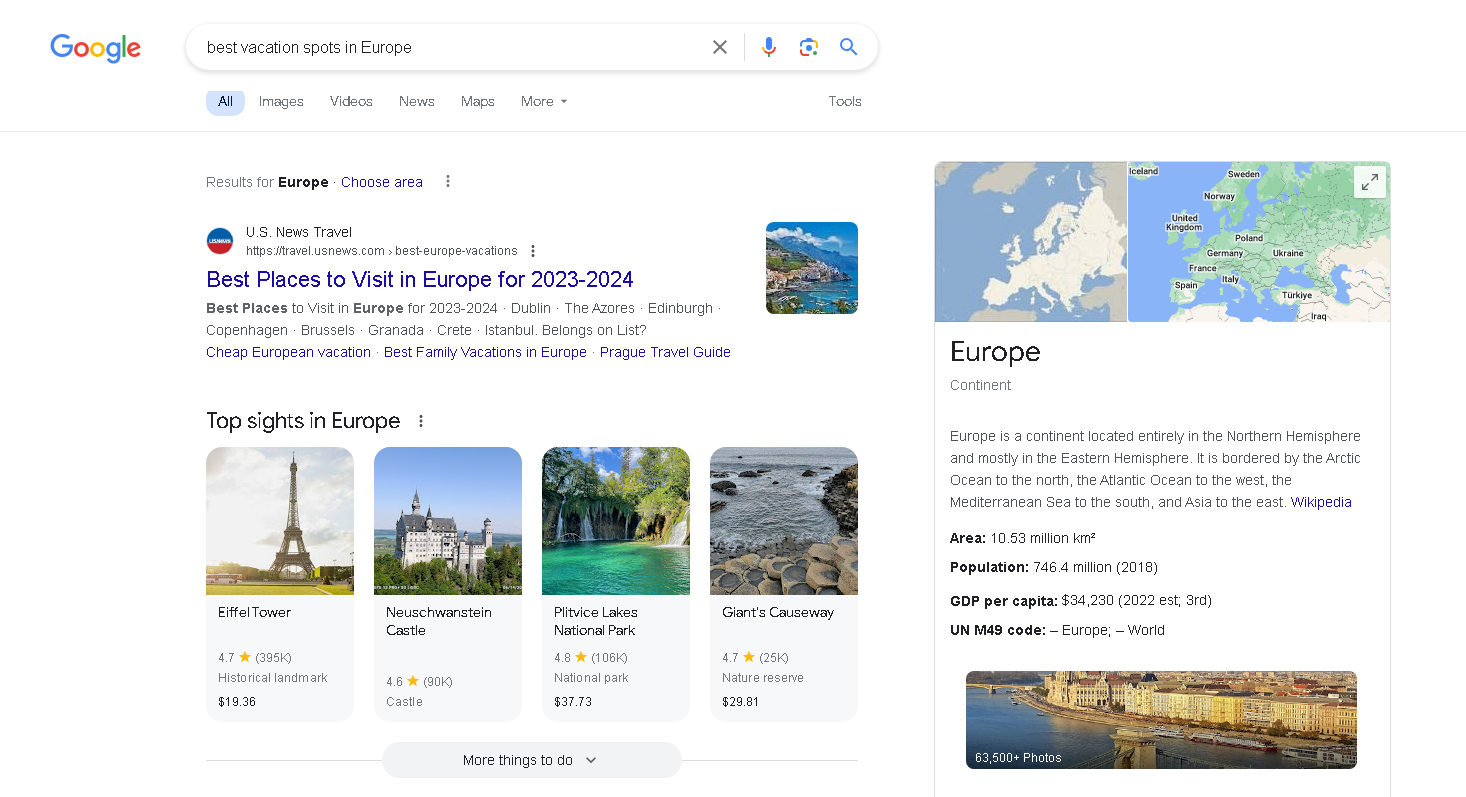
Instantly, you’re presented with a rich array of results: articles, travel guides, images, maps, and more. But what’s behind this seamless experience? It’s Entity SEO at work.
Entity SEO transforms how search engines understand and present information. It’s not just about keywords anymore. Google has evolved to comprehend the context and relationships between words, entities, and topics.
At its core, Entity SEO is about understanding the intent behind a search.
When you search for "best vacation spots in Europe," Google knows you’re looking for more than just a list of places.
Google knows you want detailed information, reviews, and perhaps even booking options. It aligns search results with user intent, providing comprehensive answers rather than isolated pieces of information.
For your information, user engagement increases when search results are relevant and comprehensive. Also, the click-through rate (CTR) for rich snippets—those enhanced results powered by Entity SEO—can be as much as 58% higher than regular search results.
That means users find the information they need more quickly and easily, leading to higher satisfaction and longer engagement times.
Does it affect SEO directly?
Absolutely, Entity SEO has a direct impact on your SEO performance.
When Google understands the entities related to your content, it’s more likely to feature your site in rich snippets, knowledge panels, and other enhanced search features.
The result? Increased traffic and engagement, which in turn establishes your website’s authority on search engines.
The Role of Structured Data in Entity SEO
When Google understands the entities related to your content, it’s more likely to feature your site in rich snippets, knowledge panels, and other enhanced search features.
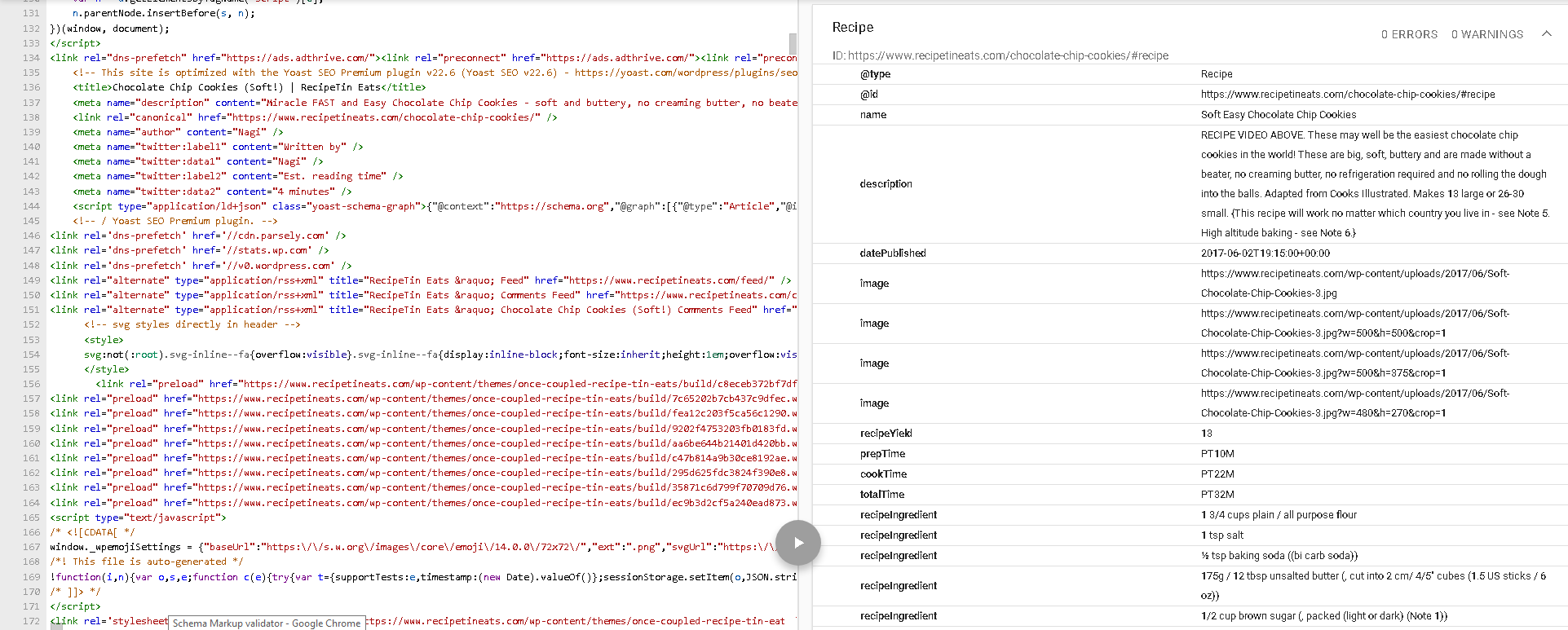
This not only drives traffic but also establishes your site as an authoritative source. For instance, a business featured in a knowledge panel is perceived as more credible, leading to increased trust and potential customer conversions.
Structured data is the backbone of effective Entity SEO. It helps search engines understand the content of your web pages by providing a clear, organised framework.
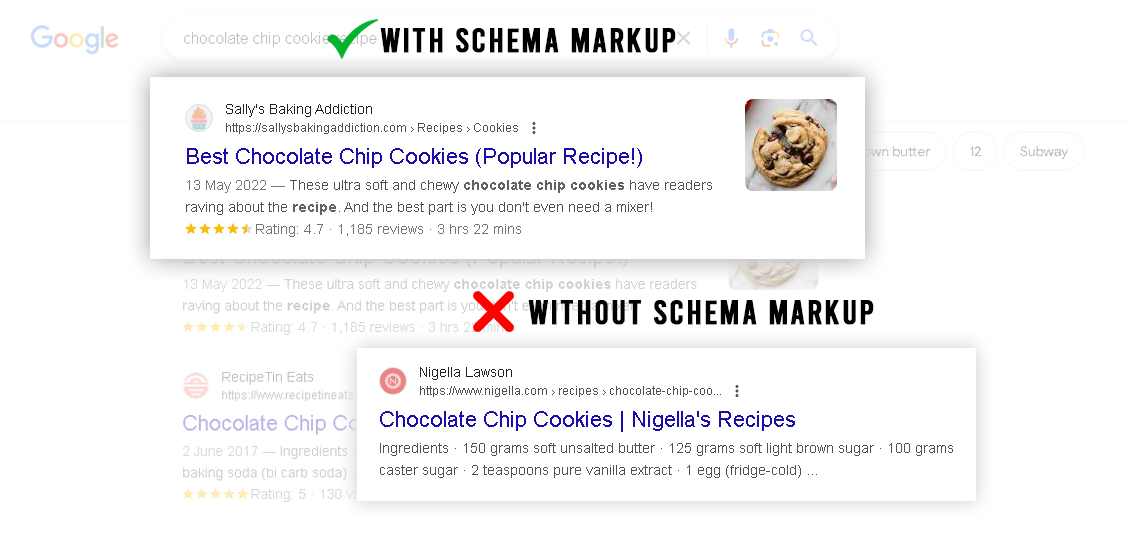
Schema markup creates an enhanced description (also known as a rich snippet), which appears in search results.
Steps to Implement Structured Data:
- Identify the Entities: Begin by identifying the key entities related to your content. For a recipe site, these might include ingredients, cooking methods, and nutritional information.
- Use Schema Markup: Add the appropriate schema markup to your HTML. For recipes, you might use the Recipe schema.
- Test Your Markup: Use Google's Structured Data Testing Tool to make sure your markup is correctly implemented. This tool helps you identify and fix any errors so that your structured data is properly read by search engines.
- Monitor and Adjust: After implementation, monitor your search performance. Use tools like Google Search Console to see how your rich snippets are performing and make adjustments as needed.
Let’s check the structured data in action
Let's say you run a local bakery and you want to improve your online visibility.
Structured data improves the chances of your business appearing in local search results with detailed information.
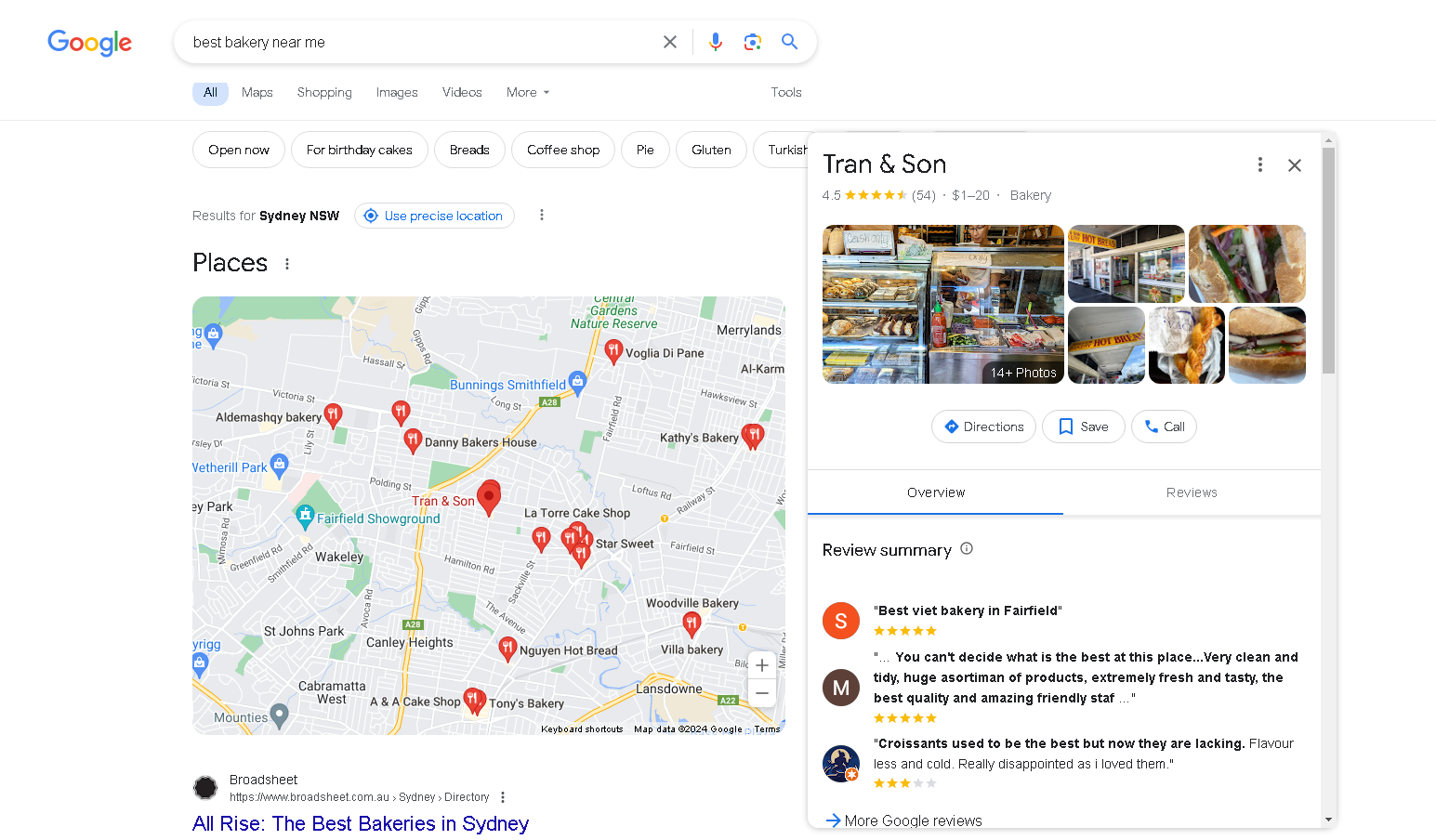
This might include your business hours, location, customer reviews, and even photos of your best-selling items.
For example, when someone searches for "best bakery near me," your bakery could appear with a rich snippet showing your business name, a map of your location, and the star ratings.
Structured data and Entity SEO work hand in hand. While structured data provides the framework for search engines to understand your content, Entity SEO ensures that this content is recognised in the context of the broader web. This synergy enhances your visibility, credibility, and ultimately, your search rankings.
How to Identify Entities Relevant to Your Business?
It begins with the understanding that entities bridge the gap between unstructured text and structured data. They provide a semantic layer that enhances how search engines and users perceive your content.
Consider your industry and the specific topics that define your business. Start by brainstorming the core themes and subjects that are central to what you do.
For a local bakery, entities might include "bread," "pastries," "artisan baking," and "local ingredients." These are not just keywords but concepts that encompass a range of related information.
Next, delve into competitor analysis. Look at the top-performing websites in your niche. Examine their content to identify recurring entities.
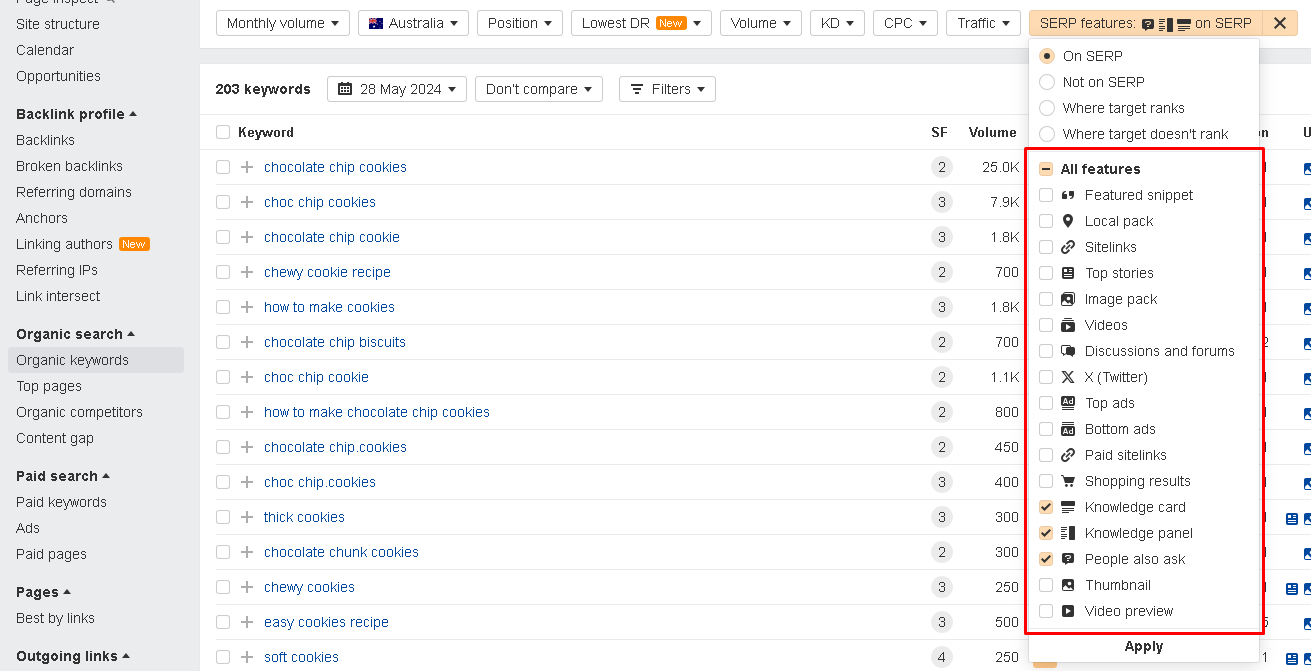
You can get this done manually or with tools like SEMrush and Ahrefs, which offer insights into the keywords and entities your competitors are ranking for.
Notice how these entities are used in context, contributing to a richer understanding of the subject matter.
To further refine your list of entities, utilise Google Trends and Google Search Console.
Google Trends helps you track the popularity of different entities over time, providing insights into seasonal trends and emerging topics. Search Console, on the other hand, gives you data on the search queries that bring users to your site.
Imagine you’re running a content campaign for your eco-friendly product line. You might discover that "sustainability," "eco-friendly packaging," and "carbon footprint" are significant entities. These terms not only describe what your products are but also connect to broader topics and values important to your customers.

Now, let’s talk about leveraging these entities effectively. Incorporate them naturally into your content. I’m not talking about stuffing keywords; it’s about creating a web of interconnected ideas that provide value. For instance, a blog post about your eco-friendly packaging could link to articles on sustainability and carbon footprint reduction, each enriched with detailed information about these entities.
The task doesn’t end with identification. Regularly update and expand your entity list. SEO is dynamic, and new entities emerge as industries evolve. Keep an eye on trends and continuously refine your approach to stay relevant and authoritative.
Lastly, think about the broader knowledge graph. How do your identified entities connect to others in the same domain?
For example, "organic farming" might link to "pesticide-free" and "sustainable agriculture." Understanding these connections helps you build a more comprehensive and interconnected web of content, enhancing both user experience and search engine comprehension.
These actions are very important as you are not only enhancing your SEO but also providing richer, more valuable content to your audience.
Natural Language Processing (NLP) and Its Impact on Entity SEO
Natural Language Processing (NLP) is a cornerstone of modern Entity SEO. It enables search engines to understand and interpret human language in a way that goes beyond mere keyword matching.
NLP helps search engines identify and categorise entities within your content. It does this by analysing the relationships between words and phrases.

For example, if your content discusses "renewable energy sources," NLP can distinguish between entities like "solar power," "wind energy," and "hydroelectric power." This understanding enables search engines to provide more relevant search results.
Google’s BERT algorithm is a prime example of NLP in action. BERT, which stands for Bidirectional Encoder Representations from Transformers, helps Google understand the nuances of language, such as the importance of prepositions in a query. This enhances Google’s ability to match search intent with relevant content.
Consider a user searching for "how to start a small business."
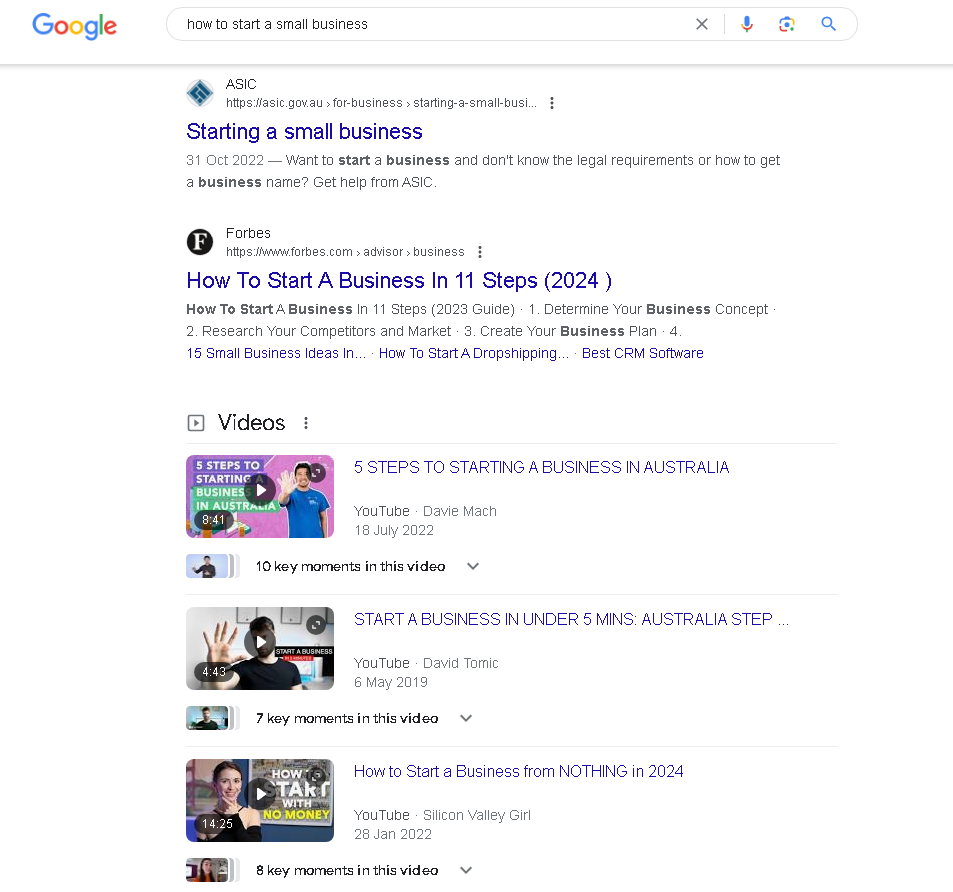
NLP allows Google to understand the context of the query, recognising that the user is looking for guidance, resources, and steps involved in starting a business. Consequently, the search results will include articles, guides, and possibly even video tutorials that are comprehensive and relevant.
For SEOs, leveraging NLP means optimising content to be contextually rich. Instead of focusing solely on keywords, you should ensure that your content comprehensively covers the topic.
Complicated, isn't it?
We know it sounds complex. But that's where we come in.
At Marketix Digital, we're a premier SEO agency with expertise in Entity SEO and everything related. We handle the intricacies so you don't have to.
Ready to simplify your SEO strategy? Contact Marketix Digital today and let us help you achieve superior search rankings with precision and efficiency.
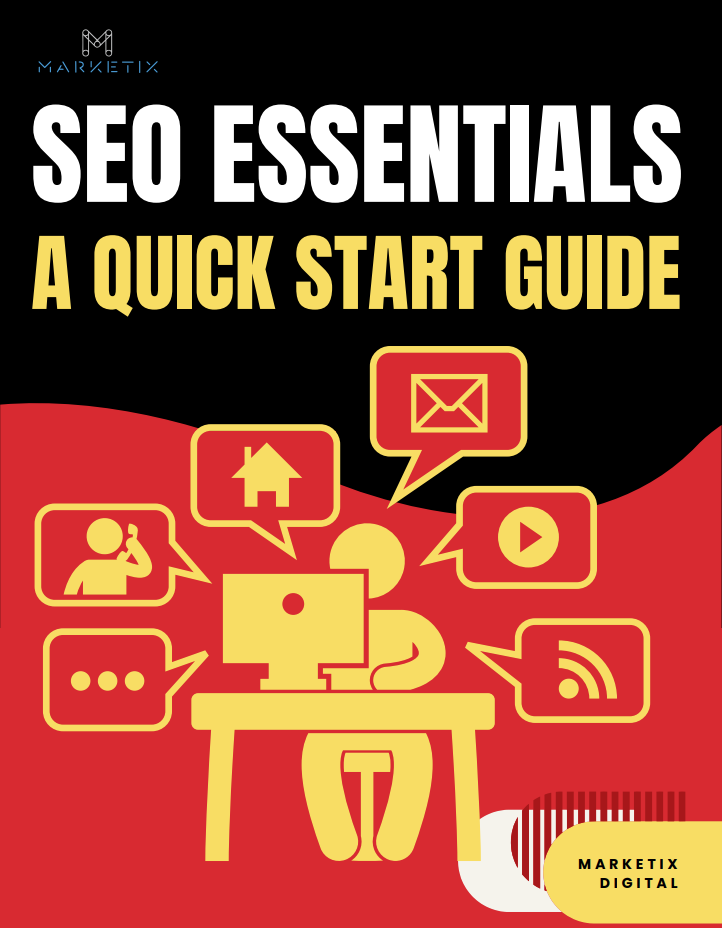
Free Download SEO Book
Download our 24-page SEO book to learn:
- How SEO Really Works
- How to Rank #1
- Content & SEO
- Choosing an SEO Agency
Thank you!
You have successfully joined our subscriber list.



